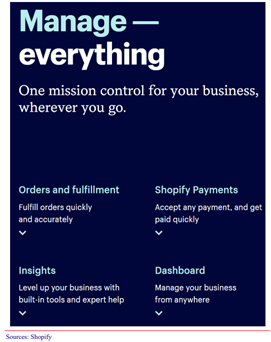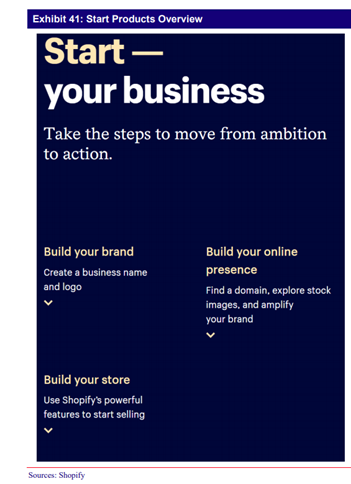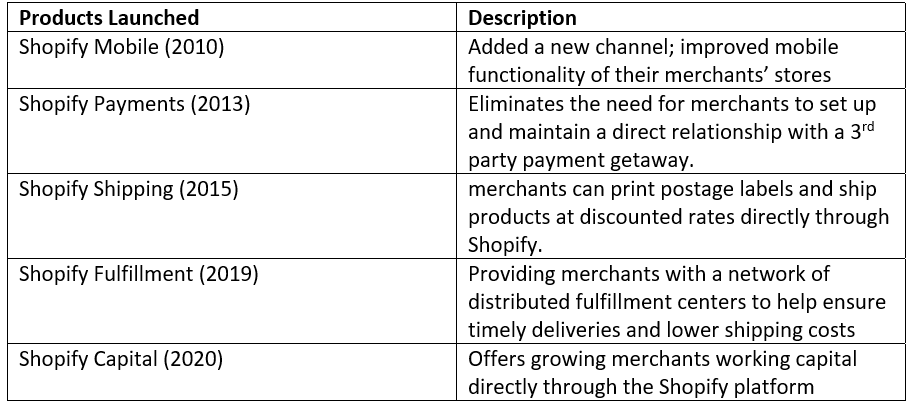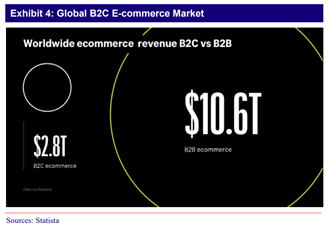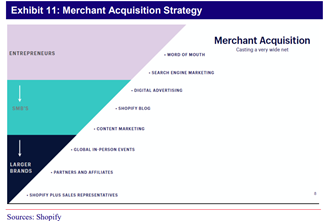Case Study
Shopify : Arming the Rebels
Overview:
Shopify’s Solutions for Merchants
Macro trends
Competitive Advantages (Their Offerings)
Shopify’s Elegance and Competition
Shopify : Arming the Rebels
Overview:
Shopify’s Solutions for Merchants
Macro trends
Competitive Advantages (Their Offerings)
Shopify’s Elegance and Competition
Shopify is a cloud-based commerce platform, providing tools to start, grow, market and manage a retail business of any size. Shopify builds web and mobile based software and lets merchants easily set up online storefronts rich with functionality.
The Shopify platform fulfills front & back office needs for merchants, providing a single view of their business and customers across all sales channels, allowing them to manage products & inventory, process orders and payments, ship orders, leverage analytics and get financing.
Brand ownership: Shopify is designed to help merchants own their brand, develop a direct relationship with their buyers, and make their buyer experience memorable and distinctive. This is different from say Amazon, where merchants are at the mercy of the marketplace, where
a lot of it comes down to being listed as the top products on the search engine. The Shopify platform is designed to allow a merchant to keep their brand present in every interaction to help build buyer loyalty and competitive advantage.
Shopify’s mission is indeed to make commerce for everyone, and they can help merchants of nearly all sizes, from aspirational entrepreneurs to large enterprises (Shopify Plus). The majority of merchants are on subscription plans that cost less than 50$/month.
Shopify’s greatest asset might be intangible, the ability to iterate and pop out new offerings for merchants. Indeed, R&D focused on smaller merchants by simplifying their user experience and arming them with new ways to compete with larger competitors, as well as for larger
merchants seeking technology and support for higher volumes and global reach. They continue expanding the capabilities of their platform so merchants be among the earliest adopters of commerce innovation. Below are some of the fruits the Shopify culture has yielded:
Macro: Baird estimates an incremental shift of 200B$ in annual retail spend in the US from offline to online channels. Shopify also benefits from selling direct to consumer (DTC) trends. By eliminating the need for merchants to piece together the different functions
and features necessary to operate an online storefront, Shopify will continue to take share, as the convergence of physical digital progresses. And Shopify has a leading position in the social commerce market by enabling merchants to sell through IG, Pinterest, etc.
Shopify’s unique features:
Partner ecosystem: Shopify operates a partner program which improves the functionality of the platform. The Shopify partner ecosystem is made up of 3 main parties: agencies, app developers and theme designers. These partners increase the functionality
Partner ecosystem: Shopify operates a partner program which improves the functionality of the platform. The Shopify partner ecosystem is made up of 3 main parties: agencies, app developers and theme designers. These partners increase the functionality
& aesthetics of Shopify storefronts, which drive increased merchant adoption and higher rates of loyalty. Shopify also offers its partners revenue sharing from client referrals, extending Shopify’s sales channel. I find the partner ecosystem similar to the App Store ecosystem.
Shopify uses its partner network to offer merchants access to Shopify Experts, a directory of designers, developers, marketers & photographers to assist merchants in the creation of their online store. These partners also help the company iterate and provide feedback for changes.
Shopify Payments also means the company generates a portion of its revenues based on sales volumes, which more directly aligns Shopify with the success of its client base. Shopify is one of the only commerce platforms that offer an in-house branded payments solution, w/ Stripe.
The transaction is taken as a % of GMV. There is a large runway for payments, since only roughly 40% of GMV is currently processed on its payments platform. By providing payments & other back-office functions, Shopify satisfies the entire flow of services for SMBs.
International growth will supply a major leg of Shopify’s growth. Intl. markets accounted for the lion’s shares of new merchants (70% prior to Covid). There’s a long runway there as only low double-digit figure are from intl merchants.
Shopify's investment in fulfillment centers make it a direct competitor to Amazon. Fulfillment centers are where businesses’ inventory is stored and where order are prepared for fulfillment of customer orders. This offering was since merchants often found it complex & expensive
to fulfill their orders to customers quickly. Prior to Fulfillment’s launch, Shopify had a 95% success rate with 4-10 days shipping, but the fulfillment product has improved that to 99% being shipped on the same day. This offering allows Shopify to significantly improve SMBs
level of competitiveness in the market. Fulfillment centers require incredible amounts of investment and logistics planning, but at scale, Shopify plans to 10x its current demand capacity thanks to its partnerships with 3rd party logistic providers. As Stratechery says, Amazon
is pursuing customers and bringing suppliers and merchants on its platform on its own terms. Shopify is giving merchants an opportunity to differentiate themselves and have a unique, noticeable, non-Amazon offering to customers.
This leads me to muse that Facebook and Amazon are going to become competitors in the marketplace segment and Zuck is going to become a public darling for allowing entrepreneurs to thrive while Amazon is known for obscuring customer data or hiding their brand with packaging.
Their elegance: Shopify is a feel good story, it makes possible for entrepreneurs to build up their dreams with the weapons Shopify provides them. Shopify should also have good runway with the Facebook Shops partnership, where Shopify will now be providing the infrastructure for
D2C businesses on Facebook. Some experts are calling for FB to become one of the biggest marketplaces on the Internet and its merchants will have to ship products.
Merchants’ success is Shopify’s success because as merchants grew their sales, they consume more of Shopify’s solutions and upgrade to higher subscription plans and purchase additional apps. A cool metric about Shopify is that their revenue is consistently lower than the
revenue the businesses in their platform make, showing that Shopify is not capturing the full value its ecosystem has created.
To conclude, the culture of iteration, partner ecosystem, fulfillment centers and a long runway for growth in the ecommerce space should make Shopify a winner in the ecommerce space.
$SHOP
$SHOP
Here is the complete write-up. Subscribe for weekly deep-dives into some great businesses with long runways for growth. https://secretcapital.substack.com/p/shopify-case-study-arming-the-rebels

 Read on Twitter
Read on Twitter